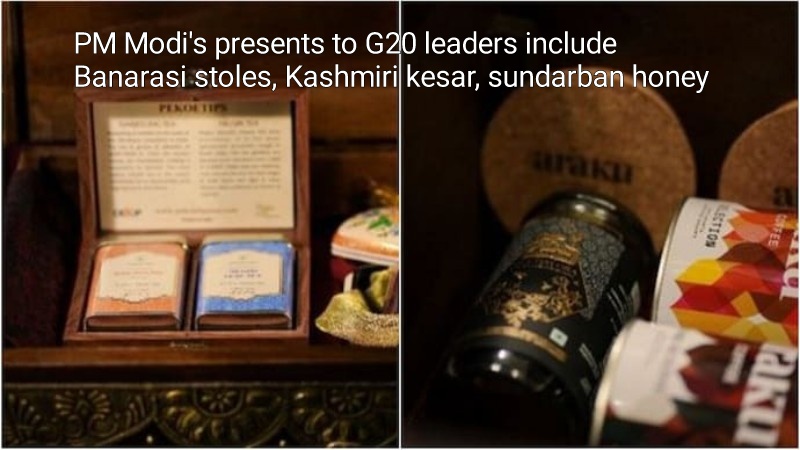
For the G20 Summit, world leaders and foreign delegates recently travelled to India. Prime Minister Narendra Modi gave them unique gifts before they left for their countries. These presents are a carefully chosen assortment of handcrafted items that reveal much about the rich cultural heritage and traditions of India.
A carefully curated selection of gifts, including Sundarban honey, Kashmiri saffron, Baranasi stoles, Araku coffee, Darjeeling tea, and others, were chosen to accurately reflect India’s distinctive uniqueness. Look at the gifts that the G20 leaders received:
Made up of silk threads and intricate work, the Banarasi stole represents Varanasi’s cultural richness and its weaving heritage. It was presented to Spanish Prime Minister Pedro Sánchez’s wife, Mara Begoña G³mez Fernández.
The stole is presented in an ebony wood Jali box that was created by Keralan artisans employing intricate ‘Jali’ work on the highly dense and fine-textured Indian ebony wood.
Sheesham Wood Sandook was made by hand from Sheesham (Indian Rosewood) and comes with brass strips. The substance is prized for its hardiness, unusual grain patterns, and deep colour. The wood has a brass patti (strip) inlaid within it.
The most exotic and expensive spice in the world is saffron, also known as ‘zafran’ in Persian and ‘kesar’ in Hindi. Saffron has long been prized for its culinary and therapeutic properties across many nations and civilizations.
Saffron is not only a pricey and popular culinary spice, but it also has several health advantages due to its abundance of antioxidants.
A Kashmiri textile called pashmina has long represented royalty. The wool is produced by combing, rather than shearing, a particular breed of Himalayan goat.
Using centuries-old techniques, skilled artisans hand-spin, weave, and embellish their fragile fibres. As a result, a delicate, detailed stole that epitomises timelessness and craftsmanship is produced.
Rosângela da Silva, the spouse of Brazilian President Lula Da Silva, received it.
The Sundarbans, the biggest mangrove forest in the world, is situated in the Bay of Bengal on the delta created by the confluence of the Ganges, Brahmaputra, and Meghna rivers.
Wild honeybee colonies can be found there. People used to seek for honeycombs in the wilderness before the practise of beehive farming became widespread.
The first terroir-mapped coffee in the world, Araku Coffee is cultivated on organic estates in the Araku Valley in Andhra Pradesh. The rich soil and mild temperature of the valley are evident in the flavour of these coffee beans.
The coffee is renowned for its distinctive flavour and texture.
Odisha is where the Ikat stole first appeared. The ‘Ikat’ method was used to create the vintage mulberry silk stole. On silk or cotton, the procedure involved tying and dying while leaving the tied areas undyed.
Kobita Ramdanee, the wife of Mauritius Prime Minister Pravind Jugnauth, received the stole in a teak wood box. Using tough and resilient teak wood, Gujarati artisans constructed the box.
Khadi is a sustainable fabric renowned for its versatility and texture. It can be spun from wool, jute, silk, cotton, or silk.
These complex threads are hand-spun and hand-woven into the ultimate fashion statements worn all over the world by India’s rural craftsmen, who are 70% women.
‘The Champagne of Teas’ is another name for Pekoe Darjeeling and Nilgiri Tea. The most expensive tea in the world is Darjeeling.
Only tender shoots are manually selected from shrubs that are grown at elevations between 300 and 5000 feet in West Bengal’s hills. The aromatic cup of this tea reflects these qualities.
PM Modi’s gifts to the G20 leader include Kashmiri kesar, Sundarban honey, and Banarasi stoles.

Post Your Comments